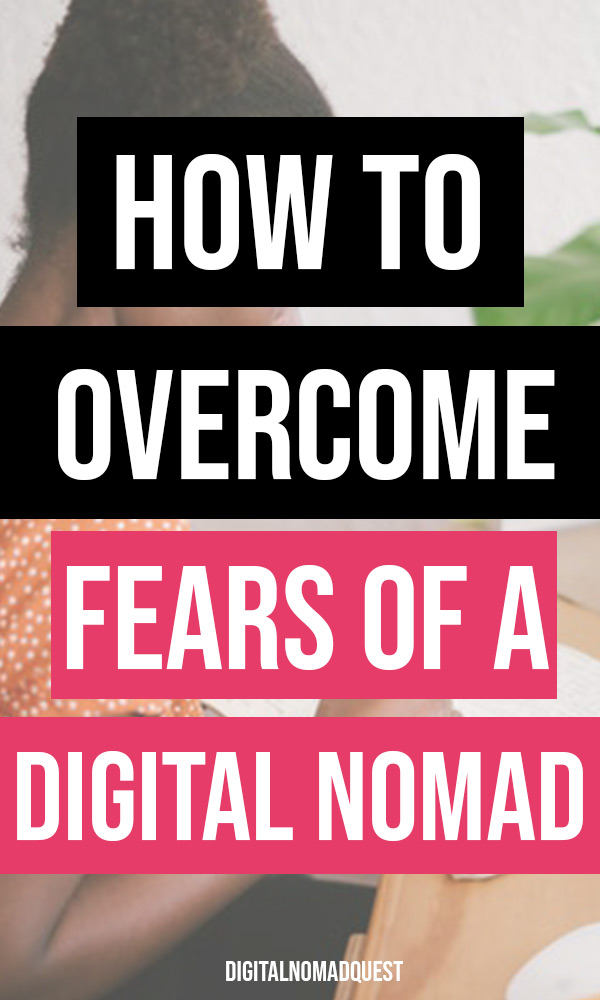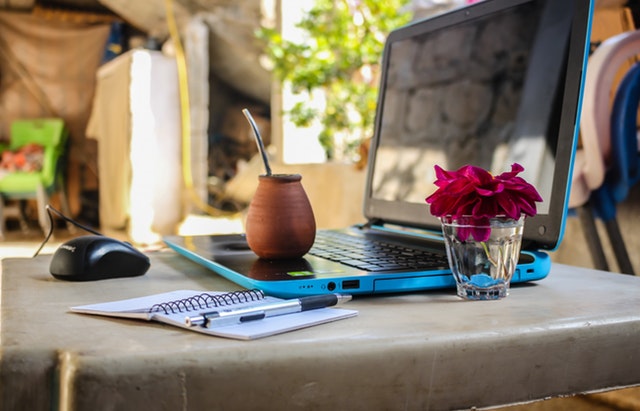The life of a digital nomad can look very appealing but also requires that you jump in with both feet. Taking that risk can be scary when there are so many unknowns, especially when you are choosing to leave the stability that comes with a regular salary. However, in compromising some of that stability, you are gaining freedom, excitement, and adventure beyond your wildest dreams! Becoming a digital nomad allows you to travel the world, experience different cultures, work wherever you please, and meet so many new and different people. That being said, taking this leap should be about working towards doing something you love instead of just running away from something that you hate. While the term nomad may seem like this is an aimless and wandering career path, having a plan in place is actually an important component to being successful in this lifestyle. Even the best laid plans will still require room to improvise, adapt, and overcome. Here are the most common fears associated with becoming a digital nomad and how to overcome them through planning, improvisation, and adaptation. Enjoy this post on how to overcome fears of becoming a digital nomad!
How to Overcome Fears of Being a Digital Nomad
Social Media vs Reality
While some influencers or ebook authors may have you thinking that the nomad lifestyle involves doing the bare minimum amount of work from a sunny beach while sipping a cocktail, that is not quite how this works. There is still a fair amount of hard work that is required in order to succeed. If you want to travel abroad and do the bare minimum, then I think what you’re looking for is actually just a holiday. Being a digital nomad means that you can work from anywhere thanks to modern technology, but the key word here is work. Unless you manage to have enough success to have a source of passive income (more on that below), then you should still expect that you will have to put in a certain number of hours of work per week in order to make a living.

Making Enough Money
The most appealing places to digital nomads tend to be the countries that have a lower cost of living such as Thailand, Bali, India, and others. This means that your monthly income can be much lower while still keeping a roof over your head and food on your table. That being said, it is still important to manage your money carefully and have a stash of emergency savings if you should find yourself without enough work for a period of time. However, this is the same kind of good financial planning that you should be doing at home too.
Having a source of passive income is the easiest way to be able to “get more bang for your buck” and do less work while still making enough money. A great example of passive income is a blog that generates revenue from ads or affiliate links. Creating a blog about your travels may be just the thing to support your lifestyle while being able to generate enough passive income to work a bit less. Some other examples include app development, ebooks, investments, drop shipping, and renting out property.
If you don’t have a source of passive income, then consider your skills, what kinds of jobs you can take on, and how many jobs you would need in order to make enough monthly income. The added challenge with being a digital nomad is the global marketplace that you are competing with online. This means that, in order to succeed, you will need a skill set that is either unique, a niche service, or adds value to the services you offer compared to the people around the globe who can charge pennies on the dollar for the same type of service. Mostly this comes with work experience or ongoing learning and development. Properly marketing yourself, your skill set, and your previous work can make you a more appealing choice in some cases. Networking can also play an important role in growing a clientele; referrals and word of mouth are the most powerful marketing tools that money can’t buy.
Being on Your Own
Being alone and half a world away from family and friends can be scary, especially if it happens to be the first time you’ve gone overseas or the first time you’ve been away from family for any length of time. Not having a travel companion to go abroad with can also be a barrier to taking the plunge for many. Taking this leap alone can be incredibly intimidating.
While it’s reasonable to have fears about being lonely, you can shape your experience by engaging with other people along the way. There are plenty of groups on social media platforms such as Facebook and Meetups that connect digital nomads living in certain areas. Simply search “digital nomads” along with the name of the city you are staying in (or nearest major city) to find a group of people who can relate to your experience of working abroad. There will also be no shortage of opportunities to engage with other people as long as you are out and about. Connect with other people in cafes or restaurants, especially those who seem to be on their own as well; or while you are in transit to a new destination make conversation with the folks around you who are going to the same place; depending on where you stay, hostels are also a great opportunity to make new friends. Before you know it, you’ll have a network of friends across the globe.
Being in a foreign country on your own can also be intimidating in the case of emergencies. If you happen to be in a place that ends up having civil conflict, or part of a country that perhaps isn’t as safe to be alone in (particularly if you’re traveling solo as a woman) it can be scary to not have a trustworthy companion to have your back. Or if you’re on your own and get sick or injured, it can be scary not to have family or friends to help you get the care you need or support you through a tough illness. However, the people that you connect with and humankind in general tend towards being caring and concerned for someone who is unwell and needs help.
Being prepared for any of these situations is a crucial part of your plan. Know where the embassy is in each country you go to, where the reputable medical centers and hospitals are, and what other organizations you can turn to for support in the event of any kind of emergency.

Failure
The possibility of having to admit defeat and return home due to lack of success, lack of money, nowhere to live, or even just realizing that the digital nomad life really isn’t for you can be daunting. While your loved ones want you to succeed, they will also be protective of you and have likely voiced their doubts and concerns about your plans to become a digital nomad. Worrying about failure is one thing but having family or friends being able to say “I told you so” can add salt to the wound.
The reality is that anyone can fail at anything that they decide to pursue. Even if you stayed in your home country but decided to freelance, you could end up not making enough money. The best thing you can do is have realistic expectations and plan around failure with appropriate safety nets.
Before you even leave the country, build up your business so that you have clients that reliably send you enough work to support the bare minimum income that you need to get by. Then any new business on top of that is a bonus. It’s also important to have a safety net of savings just as you would at home. Three months’ worth of salary is a good standby, but being abroad means that you should also set aside enough money to get yourself home at the end of those three months if need be.
Be prepared to work – and hard – because being a digital nomad doesn’t mean that you’ll be able to spend your days poolside while the money comes in effortlessly. Instead it just means that you can do your work whenever and wherever you please instead of from the confines of an office or the 9-to-5 business hours. So, you can get your work done poolside or you can choose to spend daylight hours by the pool while your evening hours are devoted to meeting deadlines and completing projects.
Letting Go
In taking the leap to become a digital nomad, you ultimately have to let go of a lot. Not only are you letting go the comfort of stability, having friends and family nearby, and reliable income but also your material possessions and living space too. Leaving the country indefinitely means giving up your home (or at the very least subleasing it or renting it out) and worldly possessions that you cannot take with you. Being a nomad also means that you cannot accumulate many possessions as you go if you plan to move around a lot.
While downsizing and minimalism has gained a lot of attention in the past few years, there are still many things that you will struggle to part with. It may be easy to let go of your kitchen wares with the exception of a beloved heirloom french oven, or perhaps you have curated many of your belongings already and just can’t bear to lose all of it. First, it is important to think very critically about what you really need and use as well as when (if ever) you plan to come back to your home country. Depending on these, it may be possible to ask a trusted family member to store some of your belongings if they happen to have the space. Alternatively, it’s easy enough to find secure storage units but keep in mind that this will be at an added cost, which you will need to factor in to your financial plan.
If you don’t plan to ever “grow roots” in your home country, then it’s better to let go. Give prized possessions to family and friends who will cherish them in your stead, donate clothing and everyday items that will be well used by someone in need, and sell what you can to build up that aforementioned safety net. In these ways, your belongings will serve a much better purpose than sitting in storage.
Language Barriers
If you plan to travel to places where you don’t speak the language, then communication can be an added challenge. It’s easy to worry about getting lost, being unable to tell someone what you need, or just generally not understanding.
Thankfully, modern technology has provided us with numerous translation apps that can help you communicate with others as well as learn the language. Many of these apps simply require you to speak into them in your language, the app then translates your message into the language of your choice, and finally the app broadcasts the message via the speaker on your phone.
If you happen to be without technology, body language goes a long way as well. Pointing or miming what you need can be a powerful communication tool. However, learning some basic phrases can be a simple task and if you plan to stay in one place for a longer period of time then trying to learn the language will be valuable.
Fear Not
When it comes down to it, the fears associated with being a digital nomad are rooted in uncertainty. It is human nature for uncertainty to make us fearful and anxious. Despite the best laid plans and no matter how prepared we are, life will always throw a wrench in the mix whether you stay in your safe 9-to-5 gig or decide to shed the shackles and travel the world. Life is too short to merely settle for stability when you crave something much different.


